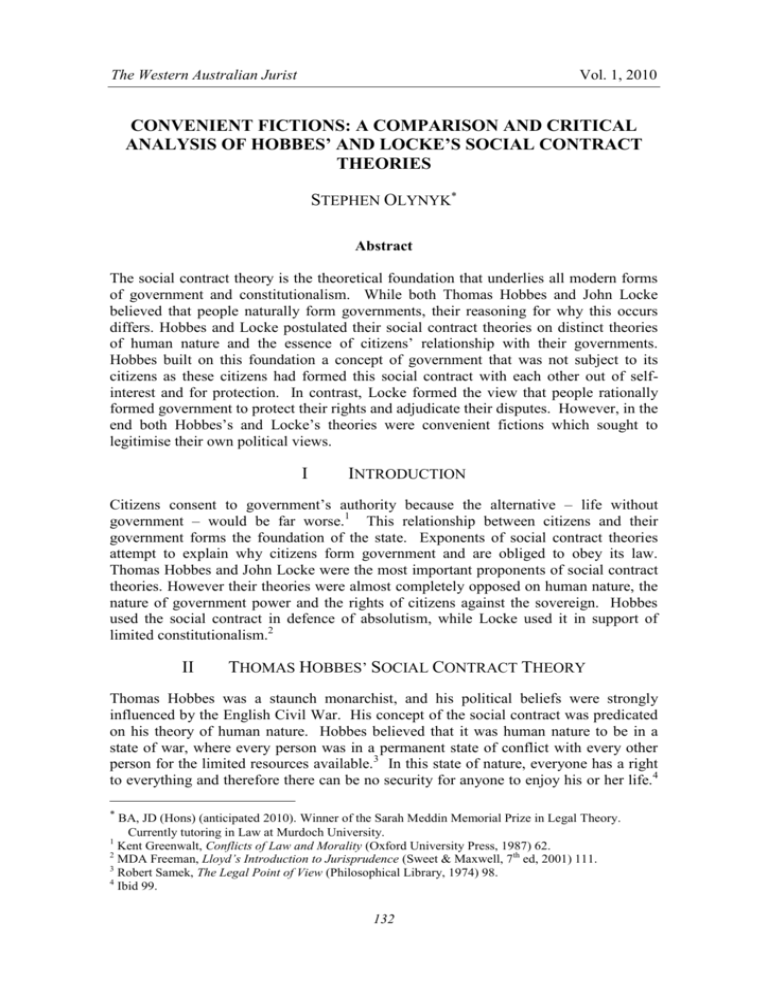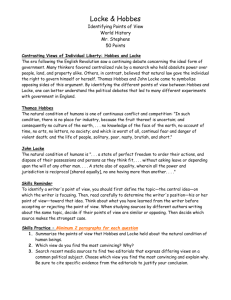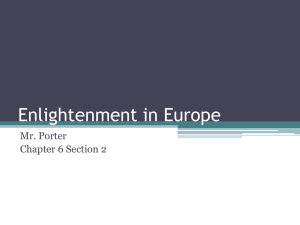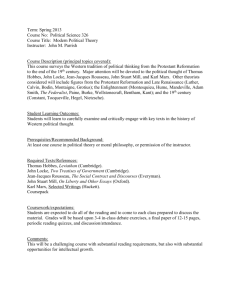Convenient Fictions - Murdoch University
advertisement

The Western Australian Jurist Vol. 1, 2010 CONVENIENT FICTIONS: A COMPARISON AND CRITICAL ANALYSIS OF HOBBES’ AND LOCKE’S SOCIAL CONTRACT THEORIES STEPHEN OLYNYK Abstract The social contract theory is the theoretical foundation that underlies all modern forms of government and constitutionalism. While both Thomas Hobbes and John Locke believed that people naturally form governments, their reasoning for why this occurs differs. Hobbes and Locke postulated their social contract theories on distinct theories of human nature and the essence of citizens’ relationship with their governments. Hobbes built on this foundation a concept of government that was not subject to its citizens as these citizens had formed this social contract with each other out of selfinterest and for protection. In contrast, Locke formed the view that people rationally formed government to protect their rights and adjudicate their disputes. However, in the end both Hobbes’s and Locke’s theories were convenient fictions which sought to legitimise their own political views. I INTRODUCTION Citizens consent to government’s authority because the alternative – life without government – would be far worse.1 This relationship between citizens and their government forms the foundation of the state. Exponents of social contract theories attempt to explain why citizens form government and are obliged to obey its law. Thomas Hobbes and John Locke were the most important proponents of social contract theories. However their theories were almost completely opposed on human nature, the nature of government power and the rights of citizens against the sovereign. Hobbes used the social contract in defence of absolutism, while Locke used it in support of limited constitutionalism.2 II THOMAS HOBBES’ SOCIAL CONTRACT THEORY Thomas Hobbes was a staunch monarchist, and his political beliefs were strongly influenced by the English Civil War. His concept of the social contract was predicated on his theory of human nature. Hobbes believed that it was human nature to be in a state of war, where every person was in a permanent state of conflict with every other person for the limited resources available.3 In this state of nature, everyone has a right to everything and therefore there can be no security for anyone to enjoy his or her life.4 BA, JD (Hons) (anticipated 2010). Winner of the Sarah Meddin Memorial Prize in Legal Theory. Currently tutoring in Law at Murdoch University. 1 Kent Greenwalt, Conflicts of Law and Morality (Oxford University Press, 1987) 62. 2 MDA Freeman, Lloyd’s Introduction to Jurisprudence (Sweet & Maxwell, 7th ed, 2001) 111. 3 Robert Samek, The Legal Point of View (Philosophical Library, 1974) 98. 4 Ibid 99. 132 The Western Australian Jurist Vol. 1, 2010 People realise that if everyone were to exercise their right to everything, this would be self-defeating and amount to a constant state of war of everyone against everyone. 5 The natural law dictates that everyone should seek peace, or live sociably, as much as possible, by laying ‘down this right to all things; and [being] contented with so much liberty against other men as he would allow other men against himselfe’.6 In Hobbes’ opinion, natural law was founded on pragmatic self-interest, rather than any innate morality. People limit their natural right to everything for the sake of obtaining peace and self-preservation.7 People form social covenants with each other out of pragmatic self-interest and these covenants form the basis for civil society.8 Hobbes’ social contract entailed subjugation to the sovereign.9 The sovereign’s power, in whatever form it takes, must be absolute and undivided.10 Hobbes’s social contract is only between subjects; the sovereign itself is not a party to the contract.11 Therefore the sovereign’s subjects have no rights to enforce against it arising out of their contract with each other.12 Hobbes believed that a powerful central authority, rather than one which rules by consent, was necessary to enforce this social covenant in the context of persons who naturally compete and disagree with one another. In his opinion democracies were too weak to survive war. The sovereign’s vague and unenforceable duty in this relationship is protecting the citizen’s safety and the internal cohesion of the state; most other forms of intervention supersede the sovereign’s role.13 In Hobbes’s social contract rebellion was not justifiable, because if citizens accept their sovereign’s protection they must also accept their sovereign’s law. III JOHN LOCKE’S SOCIAL CONTRACT THEORY John Locke proposed a very different theory of the social contract in his Two Treatises of Government. Locke’s theory was developed as a legal philosophy to underpin the English Revolution of 1688, which put an end to the divine right of kingship and its denial of a popular base for government.14 Like Hobbes, Locke’s social contract was also based upon his conception of human nature. Locke wrote in Two Treatises of Government: The State of Nature has a law of Nature to govern it, which obliges every one, and reason, which is that law, teaches all mankind who will but consult it, that being all equal and independent, no one ought to harm another in his life, health, liberty or possession … 5 Knud Haakonssen, Natural Law and Moral Philosophy (Cambridge University Press, 1996) 32. Ibid. 7 Ibid. 8 Ibid 31. 9 John Kelly, A Short History of Western Legal Theory (Oxford University Press, 1992) 212. 10 Samek, above n 3, 100. 11 Ibid 101. 12 Kelly, above n 9, 213. 13 Ibid. 14 Ibid 215. 6 133 The Western Australian Jurist Vol. 1, 2010 Therefore man used his reason to live according to the law of nature. Under this law he was bound not to injure the life, liberty or property of others and would protect himself from the encroachment of others upon his rights.15 In Locke’s opinion, people resigned their power into the hands of a government to protect their natural rights and adjudicate disputes between them. Locke stated that: Those who are united into one body, and have established law and judicature to appeal to, with authority to decide controversies between them, and punish offenders, are in civil society with one another.16 Locke believed that people are moral beings who will generally live peacefully with each other through reason.17 According to Locke, property rights were insecure; people remedied this by giving up some of their liberty to a sovereign whose purpose was to protect its subject’s entitlements.18 In Locke’s social contract, the community’s government is constituted for ‘their good and the preservation of their property’. 19 The community acts according to the will of the majority,20 while the sovereign’s power is ‘employed for [the] good and the preservation of [citizen’s] property’.21 The Sovereign’s power is not arbitrary, but rather ‘is limited to the public good of the society’.22 Should the government exceed, neglect or oppose the legitimate limits of its power it can be altered or removed by the people for a breach of its trust and replaced with another.23 IV COMPARISON AND CRITIQUE OF HOBBES’ AND LOCKE’S SOCIAL CONTRACT THEORIES Hobbes and Locke both believed that in nature people would come together to form a state for some form of protection. However, from this point on their theories diverge. Hobbes and Locke offered different hypotheses about why people formed a state. Hobbes argued that people formed a state out of pragmatic self-interest to protect themselves from each other. Locke’s theory of human nature, however, was far more optimistic. He proposed that people were fundamentally moral beings that would form a state in order to protect their inalienable natural rights of ‘life, liberty and estate’ and adjudicate disputes between them.24 Hobbes and Locke were also divided on the nature of government. Hobbes advocated the sovereign’s absolute and undivided power. In Leviathan Hobbes wrote: ‘The only way to erect a ‘Common power … is to confer all their power and strength upon one 15 Ibid 216. Peter Laslett (ed), Locke: Two Treatise of Government (Cambridge University Press, 1960) 7. 17 Freeman, above n 2, 112. 18 Ibid. 19 Laslett, above n 16, 15. 20 Kelly, above n 9, 216. 21 Laslett, above n 16, 15. 22 Ibid 11. 23 Kelly, above n 9, 218. 24 Ibid. 16 134 The Western Australian Jurist Vol. 1, 2010 man, or one Assembly of men, that may reduce all their wills, by plurality of voices, unto one Will …’25 In contrast, Locke wrote in Two Treatises of Government: ‘[The] legislative … though it be the supreme power in every commonwealth, yet first, it is not, nor can possibly be, absolutely arbitrary over the lives and fortunes of the people’.26 The divergence between both Hobbes’ and Locke’s theories on the sovereign’s power can also be traced back to their theories of human nature. Hobbes’ pessimistic beliefs of human nature required a strong central authority in order to protect the sovereign’s citizens from each other and foreign powers. In contrast, Locke’s optimistic beliefs advocated that people in a state of nature would have stronger moral limits and would be able to live in relative harmony without a strong central authority. Both Hobbes’ and Locke’s social contract theories share similar problems of binding the original parties’ successors to duties which they had never consented to assume.27 Hobbes and Locke dealt with this problem in different ways. According to Hobbes, the sovereign is not a party to the social contract and therefore citizens have no recourse against the sovereign. Hobbes believed that if the people wish for the sovereign’s protection, they must abide by its law.28 Alternatively Locke proposed that the sovereign rules on behalf of its citizens and these citizens have a right to dissolve or modify the government for a breach of this trust. Locke’s doctrine of government as a trust, breach of which will forfeit the right to govern further paved the way for modern constitutional and responsible government.29 Both Hobbes’ and Locke’s theories are not without their flaws. Hobbes makes no allowance for the moral side of people and society. His theory implies that people without states would have no moral limits. Whilst areas without effective government do present many issues, not all these people are the amoral sociopaths Hobbes describes. His theory disregards the natural tendency of people to associate without violence.30 Locke’s optimistic theory of human nature also fails to consider how an entire population, such as in Nazi Germany, can support genocide. Locke believed that remaining in a country amounted to tacit agreement to obey the laws. 31 People stay in their homelands because of language, culture, employment, friends, and family. Their inertia does not indicate approval or acceptance of government and laws.32 V CONCLUSION Both Hobbes and Locke present theories of the relationship between citizens and their government premised by their theories of human nature. Hobbes’s theory is built on a pessimistic foundation that focuses on the worst tendencies of people. In contrast, 25 Haakonssen, above n 5, 34. Laslett, above n 16, 43. 27 Kelly, above n 9, 218. 28 Ibid 218. 29 Ibid 219. 30 Ibid 214. 31 Laslett, above n 16, 98-99. 32 Jeffrie Murphy, ‘Consent, Coercion and Hard Choices’ (1981) 67 Virginia Law Review 79, 92. 26 135 The Western Australian Jurist Vol. 1, 2010 Locke’s theory may be overly optimistic in its assumption that people will generally abide by moral limits in nature. The truth probably lies somewhere in between the two extremes as history has demonstrated the flaws in both arguments. In essence both Hobbes’s and Locke’s social contract theories were convenient fictions attempting to justify existing structures.33 However both theories laid important foundations upon which modern constitutionalism and responsible government were founded. 33 Kelly, above n 9, 216. 136







